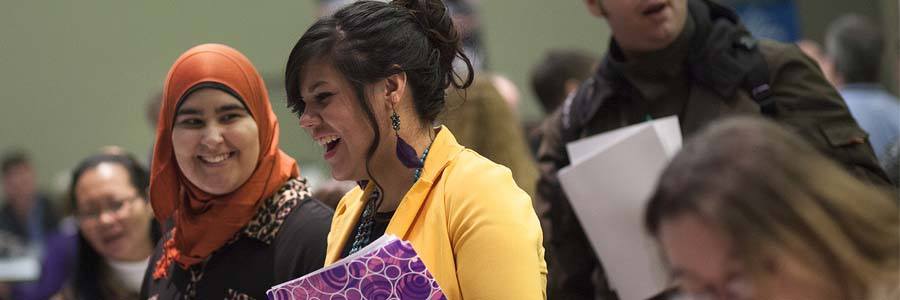Read Original Version (CLB5+) You are reading the Simple Version (CLB3-4) Skip to:
What is a job fair?
- It is an event to learn about the job market.
- It is a place where you can:
- meet employers
- get job leads
- learn about job requirements
- talk to experts and representatives of companies
- It offers workshops and lectures to learn how to succeed in your career.
Benefits of going to a job fair:
- You may get a job.
- You learn of job openings.
- Expand your network. Make yourself visible to employers.
Tips when attending a job fair:
Prepare
- Know what to expect
- Check the list of companies and the schedule of activities.
- Register or buy a ticket.
- Read the job fair’s online event page or poster.
- Call the organizer if you have questions (example: parking, how to get to the venue).
- Set your objectives
- Know what kind of opportunities you are looking for.
- Set your goals so that you’ll have direction once you’re there.
- Decide which booths you will go to. Know which workshops to attend.
- Maximize your time with a plan. Don’t walk around aimlessly.
- Do prior research
- Prepare your resume and business card
- Review your resume (follow Canadian style resume guidelines).
- Print several copies to bring.
- Some job fairs accept resumes before the event.
- Check the job fair webpage. See if they have a section for uploading resumes.
- This is done to allow companies to shortlist candidates for job openings.
- You may get a call even before the job fair.
- Exchange business cards with employers if they don’t accept resumes.
- Build contacts. You may need them at a later time.
- Create a portfolio
- A portfolio is composed of:
- a copy of your resume
- list of references
- samples of your best work
- This will help make you a stronger candidate.
- Make a plan
- Come early to talk to specific companies.
- Avoid crowds.
- You will be able to ask your questions before they get too busy.
- Make a list of questions. Make a script to introduce yourself. These will help if you are nervous about your English.
- Be prepared in case a recruiter interviews you right then and there:
- Remember to stand out in person in a way that you might not on your resume.
- Be ready with short stories. Tell them how you practise soft skills at work.
At the job fair
- Dress professionally
- Wear a business attire or business casual.
- Be neat and polished.
- Wear comfortable shoes. You will need to do a lot of walking or standing in line.
- For more tips read: How to dress for a job interview.
- Be confident
- Make eye contact.
- Have a firm handshake ready.
- Smile.
- Don’t be afraid to ask questions. But ask thoughtful questions. Don’t ask details that are already on their brochure or poster. Use your prior research.
- Always be tactful, polite and pleasant.
- Don’t interrupt a current conversation. You’ll get your turn.
- Listen well.
- If they ask you about your work, be ready with your elevator speech.
- Present your resume or portfolio when they ask for more details.
- If they don’t have a job opening for you and you’re interested in the company, ask about the possibility of getting an informational interview instead.
- Network
- Network with:
- employers
- your fellow jobseekers. They can share job leads and other information even after the job fair.
- Organizations such as service providers, professional associations, speakers at the seminars, or employment agencies.
- These are great connections that will help you grow in your field.
- Take notes
- It will be hard to remember everyone you meet at a job fair.
- Write short notes on the business cards you have collected. Note down what you talked about or how the contact was helpful.
- You can also use a small notebook to note names, companies, and other details.
- You will need these details when you send a follow-up email.
- Follow-up
- Send emails to the representatives you have spoken to at the event.
- Make it short, pleasant and straight to the point.
- It can be a thank you email to a recruiter.
- It is an opportunity to state your interest in the company. This will help make you stand out from all the other applicants.
Back to top
We'd love to hear from you!
Please login to tell us what you think.
Related Learning Activities

Thinking about your knowledge and skills is an independent learning strategy. When you think about what you can do and what… Read more »

This is our last week of Workplace Communications. This time you are in the driver’s seat. We look forward to your presentation… Read more »

We have now reached week 3 of Workplace Communications! This week, we are engaging in a number of activities that allow… Read more »

In week 2, we continue practising working with others by doing a peer review. A peer review helps you develop… Read more »
Back to top



